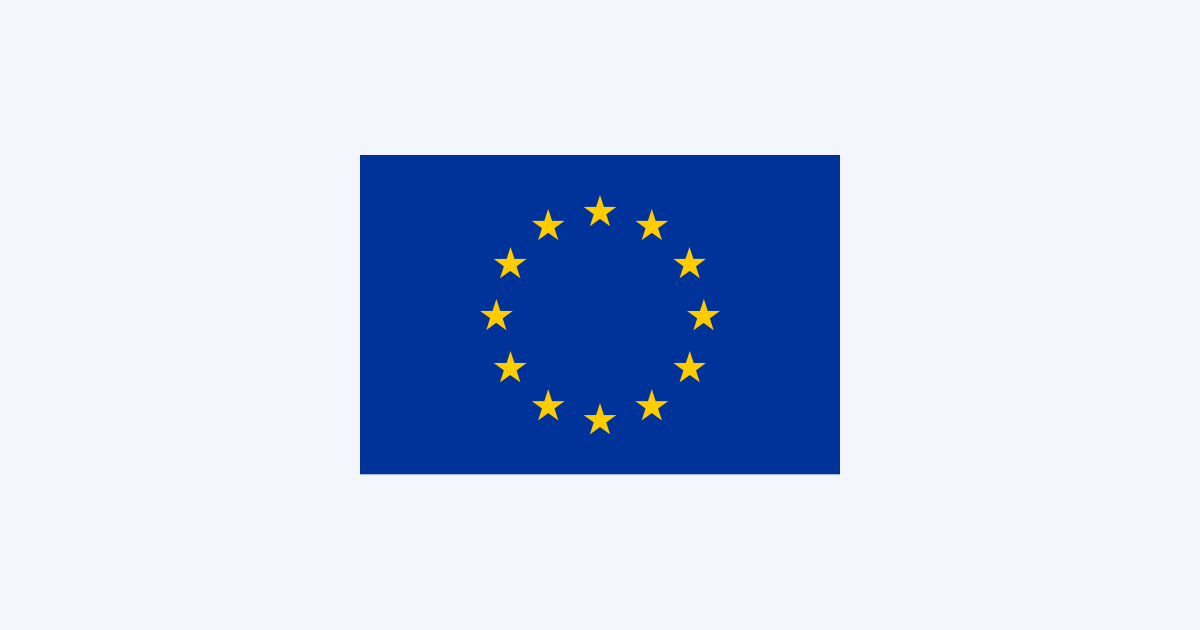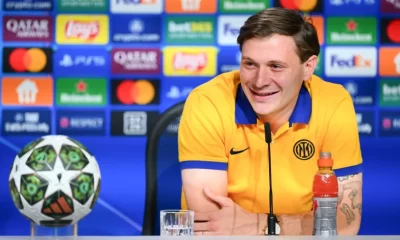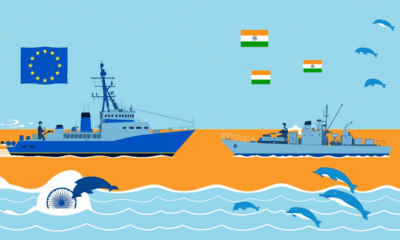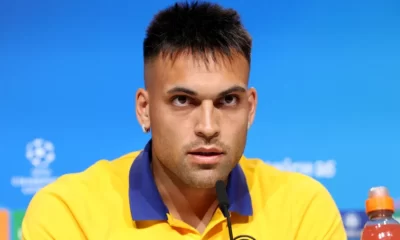Politics
Elections 2024, President Metsola “Vote. Do not let someone else choose for you”
The Key Issues in the European Parliament Elections 2024
Elections 2024 – The European Parliament Elections 2024 are just around the corner, and it’s important to be informed about the issues that will be at the forefront of the election. From climate change to immigration policies, this article provides an overview of the key topics that will shape the election and impact the future of Europe, plus, an important entry on why looking at the managing of fundamental rights could probably be one of the most important issues to look at when looking at the programs of the different parties, even if inclusion in the program does not guarantee that once in power they will not change their views…
But anyway, before we start, here is what current President of the European Parliament, Roberta Metsola, said:
“The European Union is evolving continuously. The world is changing and we must change with it. We need reform. We cannot be afraid of change. The EU is not perfect. We must embrace it as we keep listening, keep explaining and keep delivering.
I encourage everyone to recapture the sense of hope and possibility that the European Union offers. To vote. Do not let someone else choose for you. Be part of the largest democratic exercise in Europe.”
The Future of the European Union.
One of the key issues at stake in the European Parliament Elections 2024 is the future of the European Union itself. With the ongoing challenges and the rise of movements across Europe who want less EU interference in national affairs, the election will be a crucial moment for determining the direction of the EU. Issues such as EU integration, the role of the European Commission, and the balance of power between member states will all be hotly debated. The outcome of the election will have significant implications for the future of Europe and its place in the world.
Immigration and Border Control.
Immigration and border control will be another key issue in the European Parliament Elections 2024. The ongoing refugee crisis and the influx of migrants into Europe have led to a heated debate about how to manage borders and control immigration. Some parties advocate for stricter border controls and limits on immigration, while others argue for more open borders and greater support for refugees and migrants. The outcome of the election will have a significant impact on the future of immigration policy in Europe.
Climate Change and Environmental Policies.
Climate change and environmental policies will be a major topic in the European Parliament Elections 2024. The European Union has set ambitious goals to reduce greenhouse gas emissions and transition to a more sustainable economy. However, there are still debates about the best way to achieve these goals and how to balance environmental concerns with economic growth. The election will determine the direction of EU environmental policies and its role in global efforts to combat climate change.
Economic Growth and Job Creation.
Another key issue in the European Parliament Elections 2024 is economic growth and job creation. The COVID-19 pandemic has had a significant impact on the European economy, with many businesses struggling to stay afloat and unemployment rates rising. The election will determine the policies and strategies that will be put in place to support economic recovery and job creation in the EU. This includes debates about taxation, trade agreements, and investment in key industries such as technology and renewable energy.
Digital Transformation and Data Privacy.
Digital transformation and data privacy are also key issues in the European Parliament Elections 2024. With the increasing use of technology in all aspects of life, including government and business, there is a growing concern about data privacy and security. The election will determine the policies and regulations that will be put in place to protect citizens’ personal data and ensure that companies are held accountable for any breaches. Additionally, the election will address the need for digital transformation in various sectors, including healthcare, education, and public services, to improve efficiency and accessibility while also addressing concerns about data privacy and security.
Why Fundamental Rights Should Be a Priority in the European Parliament Elections
Fundamental rights are the basic human rights that every person is entitled to, regardless of their race, gender, religion, or any other characteristic. As citizens of the European Union, we have the opportunity to vote in the European Parliament elections and ensure that our leaders prioritize and protect these rights for all. Let’s make our voices heard and advocate for a just and equitable society.
What are fundamental rights?
Fundamental rights are the basic human rights that every person is entitled to, regardless of their race, gender, religion, or any other characteristic. These rights include the right to life, liberty, and security of person, freedom of expression and religion, the right to a fair trial, and the right to education and healthcare. They are the foundation of a just and equitable society and must be protected for all.
The importance of fundamental rights in a democratic society.
In a democratic society, fundamental rights are essential for ensuring that every individual is treated fairly and with dignity. These rights provide a framework for protecting individuals from discrimination, oppression, and abuse of power. Without fundamental rights, there can be no true democracy, as the basic freedoms and protections that allow citizens to participate in the democratic process would be absent. It is therefore crucial that fundamental rights are prioritized and protected in the European Parliament elections, to ensure that all citizens can live in a just and equitable society.
The impact of the European Parliament on fundamental rights.
The European Parliament plays a crucial role in protecting and promoting fundamental rights across the European Union. Through legislation, oversight, and advocacy, the Parliament has the power to ensure that these rights are respected and upheld by member states and institutions. In the upcoming elections, it is important to elect leaders who prioritize fundamental rights and are committed to defending them for all citizens, regardless of their background or status. By doing so, we can build a stronger, more inclusive Europe that values the dignity and worth of every individual.
Examples of fundamental rights that need protection.
Fundamental rights are the basic rights and freedoms that every person is entitled to, simply by virtue of being human. These include the right to life, liberty, and security of person, freedom of expression, freedom of religion or belief, the right to a fair trial, and the right to education and healthcare. In recent years, there have been growing concerns about the erosion of these rights in Europe, particularly in areas such as freedom of the press, privacy, and non-discrimination. It is essential that we elect leaders who are committed to protecting these fundamental rights and ensuring that they are upheld for all citizens.
How to vote for candidates who prioritize fundamental rights.
When voting in the European Parliament elections, it’s important to research the candidates and their stances on fundamental rights. Look for candidates who have a track record of advocating for these rights and who have concrete plans for protecting them. You can also check the party platforms to see if they prioritize fundamental rights. Don’t be afraid to reach out to candidates directly and ask them about their positions on these issues. By prioritizing fundamental rights in our voting decisions, we can help ensure that our leaders are committed to creating a just and equitable society for all.
Source link
Politics
EU changes protection status of wolves in Europe

DISCLAIMER OPINIONS: The opinions of the authors or reproduced in the articles are the ones of those stating them and it is their own responsibility. Should you find any incorrections you can always contact the newsdesk to seek a correction or right of replay.
DISCLAIMER TRANSLATIONS: All articles in this site are published in English. The translated versions are done through an automated process known as neural translations. If in doubt, always refer to the original article. Thank you for understanding.
DISCLAIMER PHOTOS: We mostly used photos images that are readily available online, from free sources, or from the people promoting the news. If by any chance it happens that we have used one of your copyrighted photos, please do not hesitate to contact us and we will take it down without question. We do not make profits as this is a not for profit project to give voice to the voiceless while giving them a platform to be informed also of general news, and it is completely free.
Politics
Commission adopts Ocean Pact to protect marine life and strengthen blue economy



DISCLAIMER: Information and opinions reproduced in the articles are the ones of those stating them and it is their own responsibility. Publication in The European Times does not automatically means endorsement of the view, but the right to express it.
DISCLAIMER TRANSLATIONS: All articles in this site are published in English. The translated versions are done through an automated process known as neural translations. If in doubt, always refer to the original article. Thank you for understanding.

– Advertisement –
– Advertisement –
The ocean shapes our economies, our food systems, even the air we breathe. To better protect our ocean, the Commission has adopted a European Ocean Pact, which will help to promote a thriving blue economy and support the well-being of people living in coastal areas.
This Ocean Pact brings together EU ocean policies under one single and coordinated framework. It will do so through a collaborative approach between EU countries, regions, and stakeholders, including fishers, innovators, investors, scientists, and civil society. Six priority areas for action will define this work, namely
- protecting and restoring ocean health by supporting EU countries in their efforts to restore degraded coastal marine habitats
- boosting the competitiveness of the EU sustainable blue economy including by strengthening the EU’s maritime industry and by introducing a Blue Generational Renewal Strategy, to foster access to young professionals in marine research, ocean tech, and sustainable fisheries
- supporting coastal and island communities, and outermost regions by presenting new or updated strategies for these regions and communities
- enhancing maritime security and defence by strengthening EU coast guard cooperation and maritime border security
- advancing ocean research, knowledge, skills and innovation by proposing an ambitious EU Ocean Observation Initiative
- strengthening EU ocean diplomacy and international ocean governance by stepping up its fight against illegal, unreported and unregulated fishing
The European Ocean Pact will be complemented by an ocean act by 2027, which will help to ensure the implementation of the priorities of the pact. An EU Ocean Pact dashboard will be used to track progress.
For more information
Press release: Commission adopts European Ocean Pact for a healthy ocean, a competitive blue economy and thriving coastal communities
More information about the European Ocean Pact
Source link
More from the author
– EXCLUSIVE CONTENT –
Politics
The European Union and the Republic of Moldova confirm their strong partnership at the 9th EU-Moldova Association Council meeting


© FRVS+MPCP 2022. The European Times® News is registered as an EU Trademark. All rights reserved. The European Times® and the logo of The European Times® are EU trademarks registered by FRVS+MPCP.
Members/Partners of

About Us
Popular Category
DISCLAIMER OPINIONS: The opinions of the authors or reproduced in the articles are the ones of those stating them and it is their own responsibility. Should you find any incorrections you can always contact the newsdesk to seek a correction or right of replay.
DISCLAIMER TRANSLATIONS: All articles in this site are published in English. The translated versions are done through an automated process known as neural translations. If in doubt, always refer to the original article. Thank you for understanding.
DISCLAIMER PHOTOS: We mostly used photos images that are readily available online, from free sources, or from the people promoting the news. If by any chance it happens that we have used one of your copyrighted photos, please do not hesitate to contact us and we will take it down without question. We do not make profits as this is a not for profit project to give voice to the voiceless while giving them a platform to be informed also of general news, and it is completely free.
Editor Picks
-
EU & the World5 days ago
Aurora Borealis Forecast: Where & When to See the Northern Lights Tonight
-

 Sports6 days ago
Sports6 days agoChampions League Final 2024-2025: PSG-Inter, official lineups
-

 Sports7 days ago
Sports7 days agoPSG-Inter, Nicolò Barella jokes about Gianluigi Donnarumma
-

 EU & the World6 days ago
EU & the World6 days agoRihanna’s Parents: About Her Late Dad Ronald Fenty & Mom Monica Braithwaite
-

 Politics7 days ago
Politics7 days agoEU and India Forge Deeper Maritime Ties with Historic Joint Naval Exercise in the Indian Ocean
-

 Sports7 days ago
Sports7 days agoPSG-Inter, Lautaro Martinez unveils recipe for finals
-

 EU & the World6 days ago
EU & the World6 days agoLoretta Swit’s Net Worth: How Much Money the ‘M*A*S*H’ Alum Had
-

 Sports5 days ago
Sports5 days agoOfficial: Damien Comolli new general manager of Juventus.








